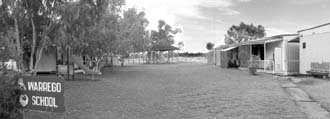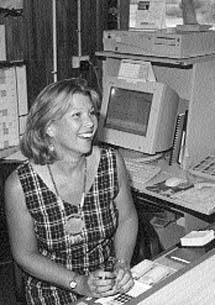"Put out the cat and turn off the
town when you leave please."
Sherrie and Marty Adams are just about
the
last to leave Warrego. Sherrie looks back on
her time in this shrinking mining town.
Paul Cockram asked a few questions ...
What's it like travelling with a roving manager who gets posted here,
there and everywhere?
I think when I met him eighteen years ago, I had no comprehension of
what a mining engineer did. I'd always lived in the city and I just
thought that he would do a job and we'd stay put like most of our friends.
Nine or ten moves later I've come to realise that that's not the case.
It's very challenging. It's make or break of a marriage and a relationship.
I think that's a really big factor. We, as a family, have tried always
to establish that we would move as a family.
So, where the job has permitted that it's not 'fly in fly out' or where
there has been a choice, we've actually chosen to move to the site rather
than for the boys and I to stay somewhere else and for him to fly in
and fly out. We thought that the family unit was really important.
So, how has it been, living with your children in a place like Warrego?
Well, having said that, we've only had one child here out of our three,
through circumstances. Our eldest stayed in New Zealand because he was
in his final years of schooling and it didn't seem appropriate to move
him here at that point of his education. So, we came with two and one
has been at the Warrego primary school where he was the only non-indigenous
child there. I think that worked quite well for him.
The other one spent a year here at Tennant Creek High School and, at
the time, Warrego still had a lot of children, so we felt the children
could have a social life out here and academically, they were running
OK. As the town has gotten smaller and smaller and there were no children
we decided that, for our middle child anyway, he needed more extension
academically and more extension socially. So, he's gone down to St Phillips
this year.
So, that's been hard. I'm travelling now with only one of three children
so, from a mother's point of view, I'm not very happy about it; but
it's one of the down sides of being a mobile family.
The difficulty is that the education system doesn't have parity. So,
whether we move from New Zealand to here or interstate within Australia
we are constantly confronted with where the children are at academically,
what grade they are, because of different standards from place to place.
What's Warrego been like over the past year?
The town at the moment is really quiet, obviously. When I arrived here
eighteen months ago there were probably over a hundred people here.
And of that there were probably twenty-odd kids. It was very social
then, there was a big sporting thrust.
At any given time there'd be touch rugby, waterpolo, tennis, darts competitions,
pool/billiards. You had the walkers, the nightly walkers that would
exercise, the gym was quite busy, lots of people doing gym work.
So, in the last year it has just wound down incredibly and now there's
about eight of us live out here permanently. All those sorts of things
have gone which is a bit sad.
For me personally though, we knew that this was going to happen, so
it's not like I walked into it and it just happened overnight. It's
been a progression of goodbyes, which has been sad. For the most part
the people who have left have left knowing that was their fate and they've
had time to make other contingency plans which has been really good.
But the saying goodbye has been really difficult and to watch the town
go, from my experience, from a hundred-odd people down to eight is hard.
My trees have kept me here. I like the fact that we live with no neighbours
looking over our fences. I like the fact that the child that lives with
us and our dogs can roam free. We have a quality of life here that some
people would find odd in that it is very peaceful, very quiet, very
pretty. I think that Warrego is incredibly pretty and at the moment,
with all the rain of course, it's very green and that contrasts nicely
with the incredible sunsets we get here.
I have no desire to move into town for those reasons. There are plenty
of reasons why it would be more convenient. I currently work in town
part time so I'm in and out four days a week now. But the lifestyle
of the solitude and the option of being here is one that I've made quite
happily.
And the school's still going…
The school is still going and really the credit for that goes to the
school teachers. Colin and Sandra Baker have been hugely involved in
keeping our school open.
Colin was the appointed school teacher and Sandra works part time there
for him in an administration role and teacher support. They were very
aware that the school numbers were dwindling quickly and the Education
Department has a policy that you must have, I think it's ten on the
roll on a regular basis.
The only way he was ever going to substantiate that number as the Warrego
community depleted was to encourage the Munglawarra community children
to come in. So, he has canvassed and got a vehicle and he goes out every
morning and picks up those children, troops them into school. We've
bought uniforms for them or the school has found funds to do that so
that everyone is dressed alike, which is really good.
He's put a program which is a broader education program which somewhat
reflects the needs of a more indigenous school. They do horsemanship
and horse riding three or four times a week, they swim every day and
he now buses them into the Swimming Club on Friday nights in town. And
they're having an opportunity to compete with town kids and I will say
they're doing very well. The town kids have had a bit of a shake up.
Colin has decided that it's really important to do that for that community.
We elected, in consultation with Colin and with our son Christopher,
to leave him at the Warrego Primary School. We have a faith in what
Colin's doing and we think it's really good for Christopher to have
this opportunity.
He won't get that with any other move we are likely to make. I don't
think he'll ever have the opportunity to be so closely involved with
a different culture. And to be privy to it and to be accepted into it,
rather than him being the majority he's by far the minority. And I think
he's getting a lot from that, I think it's a really important thing.
I don't know that he understands that at this stage. I don't think he
sees it that way but in hindsight and on reflection this is a really
interesting thing for him to be subjected to.
So, the school's doing well.


Sherrie Adams tells a good yarn.